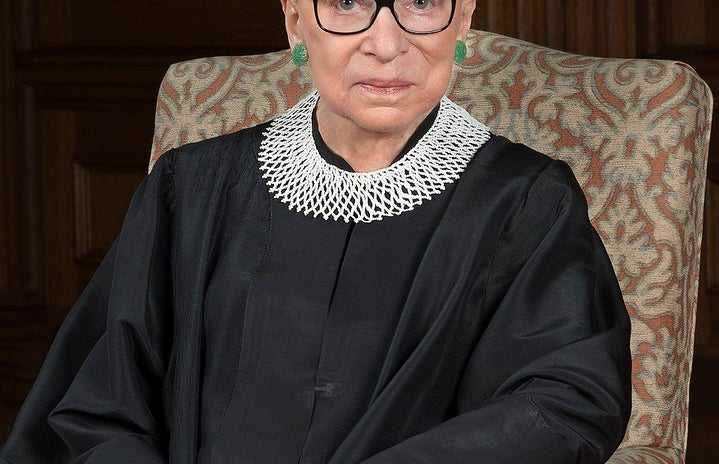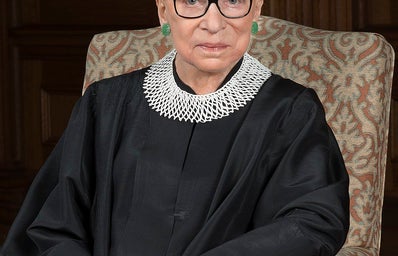In the year 1970, professor Ruth Bader Ginsburg from Rutgers School of Law became heavily involved in the newly risen issue of gender equality. After graduating top of her class from both Harvard and Columbia Law School, Ginsberg was denied the opportunity to work for any law firm in New York because she was a woman. Instead, she resorted to teaching and never felt as if she had fulfilled her dream of changing the world. Until, in 1970, a case of gender-based discrimation against a man drew her back in. This marked the beginning of her fight for lawful gender equality.
After hearing that Ginsburg had passed away only a few days ago, I felt saddened that the feminist group had lost one of its most loyal leaders. I decided the best way to honour her was to revisit a film that was based on her life and legacy; On the Basis of Sex. While the movie was enjoyable the first time I saw it upon its initial release, it was definitely a different experience revisiting it.
“…Explain why you are occupying a spot at Harvard that could have gone to a man.”
From the start of the movie it is clear that the producers made a conscious effort to show the blatant sexism against, not only Ginsberg, but other women in the narrative. It has been established from the start of Ginsbergs time at Harvard that it is not her place or any other woman’s place of support. The Dean’s opening speech includes the line “What does it mean to be a Harvard man?” This sexist attitude is seen again when Ginsberg attends the Harvard Law women’s dinner the Dean, Mr. Griswold, asks for each woman to introduce herself, where she is from and “…explain why you are occupying a spot at Harvard that could have gone to a man.” Not only did this blatant sexism make my jaw drop but it made me wonder what kind of other disrespectful comments Ginsberg actually encountered in real life. Needless to say it paints the picture perfectly; women faced horrible discrimation every day. There are countless other examples of sexist comments in the film but these two are very effective in establishing some of the movie’s most important issues.
On the topic of establishing important issues, the opening sequence is one of my favourites. A scene that struck me was the opening which features shots of a crowd of men in dark suits, moving in a slow and unified motion with a patriarchal band song playing in the background. From the crowd emerges a young woman, who happens to be Ginsberg, wearing a bright blue dress that perfectly contrasts the dark suits. What a way to establish the movie’s core theme! The simple use of bodies, colour and timeline effect all work together to give just a teaser of what the movie will be about.
“Women are too emotional to be lawyers.”
Aside from obvious use of language, there were a few symbolic moments placed throughout the film. In one of Ginsbergs classes, a male student answering a question stands above her as the two begin to argue about their answers. This visual effect, placed Ginsberg below the man and symbolizes the clear social, financial and political power men had over women at the time. This similar effect occurs at the end of the film when Ginsbergand her team are in court. When the lawyer from the opposition, Jim Bozarth, is at the stand delivering his piece, making jabs at Ginsberg’s claims the angle is shown from below; once again demonstrating the clear power this male lawyer has over her. The wonderful detail however, is when Ginsberg makes her final rebuttal, this same angle is used but it shows her in a position of power.
“You know how men are.”
Unfortunately, Ginsberg doesn’t experience this power struggle simply from her nemesis’ but at times, from her allies. Mel Wulf, the ACLU’s legal director, is reluctant to support Ginsbergwith her case and explains that she would do more bad than good, all while he sits comfortably in a chair with his feet up. This behaviour proves that Mel could not be bothered to care about sex based discrimination case as it is something that never directly affected him.
In addition to Mel’s comfortable behaviour, I noticed that on one occasion, Ginsberg gave into this power struggle herself. When the typist was working on her case’s brief, she brings up the fact that the word “sex” is used an awful lot in the writing to Ginsberg’s attention. She suggests the women change the word to “gender” so as to not distract the men who will be reading it from the more important themes and ideas. It shows that she is altering a completely appropriate word for one that was of lesser ‘concern’ in order to ensure that their brief would be taken seriously. Whether or not this was done intentionally, I will never know, it served well to the film to hint at these small but significant actions.
Fact or Fiction?
While there were many things that were done right in the film as well as a few things that could have been better, after doing a bit of reading, I discovered that historical accuracy was one of the things they did right.
It seems that many details included are true, or at least very close to the truth, as a result of the fact that the screenplay was written by Daniel Stiepelman, Ginsburg’s nephew. According to an interview with The Wrap, Stiepleman read over her brief drafts and lecture notes so that he could be heavily informed. He also took the time to sit down with Ginsberg herself and ask about her marriage.
Throughout the film, Marty Ginsburg (played by Armie Hammer) is portrayed as a supportive, kind and well-spoken man. Marty is seen as the primary household parent and the cook, all attributes that, Ruth stated to Variety, were “very, very reminiscent of Marty.” Altogether, the film does a great job of reflecting the healthy nature of Marty and Ruth’s relationship.
This isn’t to say that the movie’s accuracy is perfect because there were a few details that were altered. Though pretty much every aspect of their caring relationship is shown to its fullest, when Marty was diagnosed with cancer Ruth didn’t actually attend all his classes in addition to hers, as the film shows. In fact, she did type out all of his notes and completed his assignments while he dictated them but she only collected class notes from his friends. In addition to this slight change, the final court scene received a few alterations as well. According to The Cut, the moment when Ruth slips up and has to compose herself was only for dramatic effect. Ruth said “I didn’t stumble,” making it clear that this did not happen.
“Laws of this quality help to keep women, not on a pedestal, but in cages”
After watching the film for a second time and with a renewed purpose, I can humbly approve of the biographical drama, On The Basis of Sex. There is so much more I noted and loved about this film but the moments I touched on resonated the most. I am not a professional nor do I consider myself a feminist but from a feminist perspective, I would give the film a 9/10 for it’s historical accuracy and ability to bring attention to the on going issue of sexism.
Ginsburg was someone I will continue to admire. She was true to herself, courageous and hardworking. Not only was she fighting for her rights but for all women’s rights. As a result of her long and hard fight, I have been fortunate to grow into a young woman in a world far less hateful towards my gender. This movie sparked a passion in me that I hadn’t known was there and rewatching it only made that feeling grow.Ginsburg’s passing was a sad loss for the entire feminist movement and community but it’s important to remember that the fight does not end just because she’s gone. Her rest is well deserved and it is our time to continue this fight.
In the final moments of the scene a voiceover of the real Ginsburg is heard uttering this line: “laws of this quality help keep women, not on a pedestal, but in cages.” I do not believe that women desire to be in cages nor on pedestals. The point isn’t to be lifted, the point is to stand on the ground; feet firmly placed. When I look on either side of me I want to see both men and women, for we are equal.


